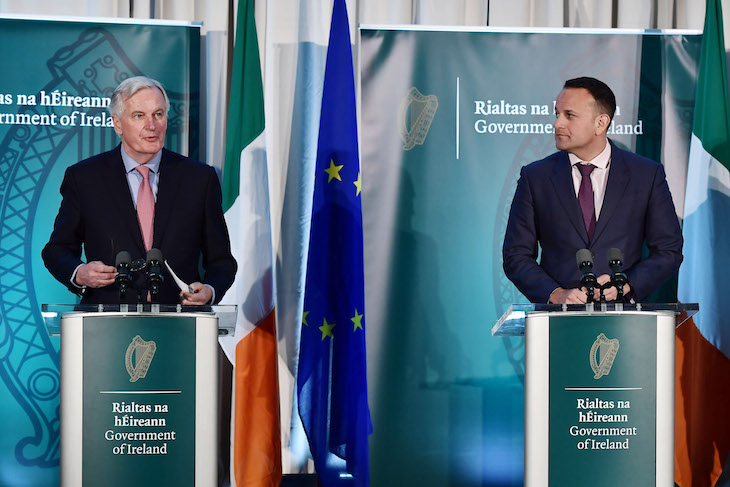In deference to public exhaustion, I’ve largely avoided Brexit in this slot. But a columnist’s output ought rightly to echo what she shouts at the television news. Big picture, the UK may have made an utter Horlicks of its putative withdrawal from the European Union because Britain should never have come to the EU with a begging bowl in the first place. Walking out first and reverting coolly to WTO rules, the UK might have negotiated from a position of strength. You don’t slap a party in the face, only to implore that same party for special favours while his face is still smarting. Big surprise, the strategy has been unavailing.
Hindsight aside, the biggest mistake the UK continues to make is to naively accept the EU’s opening construct. As I noted in November, rather than rejecting outright the legitimacy of any ‘divorce bill’, when the UK has been a generous net contributor for nearly all of its 40 years’ membership, Theresa May immediately leapt to haggle over how much. This government has consistently failed to question the underlying assumptions on which differences of opinion are founded. The EU has been setting the terms. The terms are all.
So let’s look at this Irish border matter. We’re given to believe that there absolutely mustn’t be a ‘hard border’ between Northern Ireland and the Republic. Thus we have May and her minions disappearing up their own arses trying to define what exactly constitutes this ‘hard border’ and anguishing about whether cameras count. An absence of ‘infrastructure’ along a boundary that, in legal terms, is already about as hard as it can get — between two entirely different countries — is ‘enshrined’ (that would be the EU and its Irish lapdog’s worshipful adjective of choice, enshrined) in the Good Friday Agreement.
But the GFA is not holy writ. It is a highly flawed accord, negotiated by mortal and often morally tainted antagonists in a state of late-night frenzy. It is not a set of eternal laws to live by dictated to Abraham from the Lord Thy God on Mount Sinai. Now 20 years old, the agreement could be regarded as having already served its purpose: getting the island’s excitable elements to stop killing each other. I’m not suggesting we chuck the thing. But that document was put together in different political circumstances: both nations entering into the agreement were members of the EU. Now one of them is leaving. If the document cannot accommodate this modification, something is wrong with the document, not with the historical change. For people and paper alike, the key to survival is adaptation.
The GFA itself was full of dubious compromises and exceptions — the wholesale release of prisoners, including murderers who’d served mere months; the unprecedented granting to one nation of political say in the sovereign affairs of another — all in the service of expedience. If the GFA is possible, so are a few freaking cameras between Newry and Dundalk.
Next: the policing of any national border involves entities on either side. On the British side of this one, May has been clear from the outset that the UK has no interest in heavy-handed customs or immigration enforcement. That is what is called ‘the UK’s business’. There being once again such a thing as ‘the UK’s business’ is what Brexit is all about. Whatever happens on the Republic’s side of the border is the EU’s business.
Yet supping from that begging bowl — please, sir, may I have some more? — addles the brain. Staggeringly, the EU has persuaded the PM that the EU’s prosecution of a member state’s border is her problem. May’s offer to collect the bloc’s own tariffs, and subject importers to torturous ‘rebates’, constitutes abasement. Insofar as it is a problem, that border is the EU’s problem. Trump can put up his silly wall on the US side of its southern perimeter, but even the Donald wouldn’t presume to dictate procedure on the Mexican side. It’s therefore not up to May to concoct a ‘solution’ to a problem she need not recognise and need not own.
Moreover, the EU’s professed helplessness in the face of its own bureaucracy is fake. Eurocrats make all manner of exceptions to their own laws when it suits them. (For years, Brussels has turned a blind eye to Russia’s political manipulation of energy prices to different member states, in flagrant violation of EU law. Germany gets a sweetheart deal, so who cares if the Poles are screwed?) Michel Barnier’s obduracy about the rules regarding external borders is a pose, just like his concern for ‘peace’. That guy doesn’t give a rat’s ass about Northern Ireland.
Lastly: what is the unspeakable consequence of a ‘hard border’? Chris Patten likened tinkering with Northern Irish border arrangements to carrying ‘a can of petrol and a box of matches’. Who’d light the petrol? Supposedly, IRA retrogrades, with Sinn Fein cheering them on.
Doesn’t this sound horribly familiar? It’s the same old blackmail. If one customs official checks a single boot for smuggled cigarettes, then it’s back to Tube station bombings in London. Really? I don’t find that credible. But I do find the fearful reasoning repellent. We’re supposed to stay in the customs union — and the single market, and why not the EU while we’re at it — and thus defy the democratic wishes of the British electorate, just because we’re still afraid of Sinn Fein? I’m sorry, but those losers don’t scare me anymore.
This whole conundrum is contrived. May needs to tell Barnier that the Irish border is his problem, since we don’t have one. With a nominal volume of trade, the border is sortable. For policy should be a slave to purpose, not the other way around. When bureaucracy goes wrong — look at the Home Office — it is a slave to itself. Agreements, rules, laws — they’re all malleable, mere methods by which we accomplish our aims. Alas, the UK’s aim is to escape the EU, and the EU’s aim is to stop us.







Comments